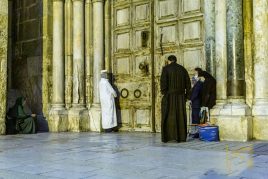
More than 5 out of 9 million inhabitants have had a first dose of the COVID-19 vaccine, and approximately 4.3 million have had a second dose. Israel’s vaccination campaign is continuing at a steady pace, making it world leader in vaccination rate per capita. With declining infection rates, the country is preparing to reopen most of its economic activities, albeit ‘in safety.’ Restaurants, hotels, cafes, cultural events and tourist attractions, heavily affected by the coronavirus restrictions, are gradually returning to business, also thanks to the Green Pass vaccine passport. Israeli authorities have also started vaccinating Palestinians working in the country or in West Bank settlements. To date, more than 100,000 have had a first dose. The introduction of the vaccine passport will also simplify access to places of worship, although health authorities don’t exclude the possibility of restrictions during Pesach, the Jewish Passover (28 March – 4 April), and the Catholic Easter (4 April).
 No closed doors. This possibility doesn’t seem to worry the Custos of the Holy Land, Father Francesco Patton, who told SIR he is sure that
No closed doors. This possibility doesn’t seem to worry the Custos of the Holy Land, Father Francesco Patton, who told SIR he is sure that
“next Easter will not be as humiliated and sober as it was in 2020”,
celebrated behind closed doors. He added: “We are already celebrating our Lenten rites almost normally, without any special restrictions, although all anti-COVID precautions – such as hand sanitation, distancing and above all the use of masks – are always in place. We are making the same recommendations to the faithful who are participating in increasing numbers in rituals such as the Way of the Cross, the Saturday night vigils at the Holy Sepulchre and the peregrinations. The latest, the fourth of the Lenten period, was held on March 18th, and went from Bethany, in the shrine situated at the foot of the Mount of Olives, to the Church of Our Father. The very positive progress of the national vaccination plan suggests that restrictions could be further relaxed by the end of the month.
 Message of rebirth. The Custos’ implicit hope is “to celebrate Holy Week in the most dignified possible way. Obviously without multitudes of people, given the absence of pilgrims, but certainly not in the disheartening and mortified manner experienced last year.” Therefore, “on Palm Sunday we will go in procession from Bethphage to Jerusalem, with a stop at Dominus Flevit as we did last year when we stopped to pray for Jerusalem. The Latin Patriarch, Pierbattista Pizzaballa will impart the blessing to the city that we will enter through the Lions Gate. The Paschal Triduum will be celebrated in a fairly ordinary manner at the Holy Sepulchre, as well as the other rites of Holy Week, at Gethsemane and in the Cenacle.” “Celebrating in a relatively normal manner is for us a source of great joy and consolation”, pointed out the Custos remembering “last year’s Easter, when we were guarded by the army and the police, surrounded by photographers.” “This year we will enter the Sepulchre and the Holy Places, with all precautions, and we will send out a message of rebirth to all.”
Message of rebirth. The Custos’ implicit hope is “to celebrate Holy Week in the most dignified possible way. Obviously without multitudes of people, given the absence of pilgrims, but certainly not in the disheartening and mortified manner experienced last year.” Therefore, “on Palm Sunday we will go in procession from Bethphage to Jerusalem, with a stop at Dominus Flevit as we did last year when we stopped to pray for Jerusalem. The Latin Patriarch, Pierbattista Pizzaballa will impart the blessing to the city that we will enter through the Lions Gate. The Paschal Triduum will be celebrated in a fairly ordinary manner at the Holy Sepulchre, as well as the other rites of Holy Week, at Gethsemane and in the Cenacle.” “Celebrating in a relatively normal manner is for us a source of great joy and consolation”, pointed out the Custos remembering “last year’s Easter, when we were guarded by the army and the police, surrounded by photographers.” “This year we will enter the Sepulchre and the Holy Places, with all precautions, and we will send out a message of rebirth to all.”
“May a powerful message of Christian hope be sent from Jerusalem to the whole world”, he said. “Returning to wave palm branches and proclaim ‘Blessed is the one who comes in the name of the Lord! Hosanna in the highest heaven!” will be of great significance.
 Return of the pilgrims. The Custos also hopes to see pilgrims return to the Places of Jesus. “Many world countries are moving forward with their vaccination plans and this gives us hope for a slow but gradual return of the pilgrims” said the Custos.
Return of the pilgrims. The Custos also hopes to see pilgrims return to the Places of Jesus. “Many world countries are moving forward with their vaccination plans and this gives us hope for a slow but gradual return of the pilgrims” said the Custos.
“A first step could be to establish bilateral agreements between Israel and the various countries to guarantee safe travel for incoming groups of pilgrims and tourists, with clearly defined and safe itineraries to prevent any potential risks.”
“I personally believe that it will take two or three years before we will see a return to some normality. In this respect, I expect to see some first positive developments after the end of the summer. I am thinking, for example, of the American pilgrims, who were always the most numerous group visiting the Holy Land, returning to travel as a result of vaccinations in their homeland. As vaccinations continue to increase in European countries, we will also start receiving pilgrims from the Old Continent. We must be patient and cautious, but it’s important to restart.”












